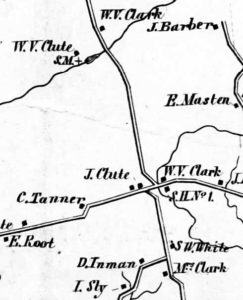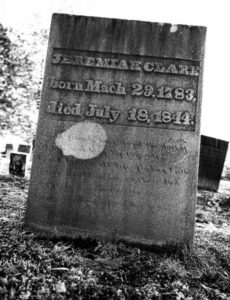Life’s Fleeting Breath: An Epitaph for Jeremiah Clark
by Dave Waite
December 17, 2021
The small, rural cemetery that sits along Clark Road in Providence, New York, silently beckoned me to stop and visit as it came into view one Autumn morning. I was happy to oblige, hoping to be rewarded with a glimpse of insight from these final reminders that mark the end of the life of those who, like us, also once smelled the fragrance of autumn and felt the warmth of the midday sun.

One stone, which stands out by the bright circular spot on the upper left, immediately caught my eye. When I got closer, I read that it marked the grave of lifelong Providence resident and farmer Jeremiah Clark. Though 177 years have passed since he was laid to rest, on the stone can still be read the details of his life: a birth on March 29, 1783; and a death 61 years, 3 months, and 19 days later, on July 18, 1844.

On the lower half of the stone there is this epitaph, well-worn from the passage of time and now barely readable:
“Could Friends have stayed the dart of death,
While watching by thy side;
Could Love recall life’s fleeting breath,
Thou would’st not sure have died.
Affection, powerless to save,
Could only weep above thy grave.”
Jeremiah Clark was the son of William V. Clark, one of the early residents in the town of Providence, Saratoga County. His father had left Dutchess County, New York in 1790 and settled on a farm along what is now Clark Road, just west of the cemetery that carries the family name. By 1807, his son, 24-year-old Jeremiah, was married to 19-year-old Polly Van Ness, and the first of their four children had been born. Two years later Jeremiah purchased from his older brother, Benedict Arnold Clark, one-half interest in a fulling mill along Alden Creek (now known as Alder Creek). In 1815, together they purchased 94 acres of woodland in the 21st allotment of the Kaderosseras patent, possibly for timber for the sawmill that they built on their property along Alden Creek. Jeremiah again added to his land holdings in 1822 when he purchased an additional 153 acres in the same allotment.
At the time of Jeremiah’s death in 1844, his son, William V. took over the mill property, which was by then known as the Clark Sawmill. Along with operating the sawmill, William served the community as Supervisor for the town of Providence seven times, from 1848 to 1875. After Jeremiah passed away, his wife Polly continued to live on their farm just south of the intersection of Clark Road on the west side of Antioch Road. Polly Clark lived to be 83 years old, and is buried next to Jeremiah in the Clark Cemetery. On the 1856 Geil map of Providence, the Clark Sawmill property along Alden Creek is at the top center of the map, William’s farm on Clark Road is in the center, and Jeremiah and Polly’s farm is along Antioch Road is at the bottom.
Jeremiah’s epitaph was taken from the poem “Stanzas on the Death of Miss Rebecca Ann Marshall.” Surprisingly, it is possible to determine where whoever chose it for his gravestone had learned of this poem, as the only time it was published before his death was in the January 1842 issue of Godey’s Ladies Book.
Godey’s was a monthly woman’s magazine that was the most widely circulated periodical in America before the Civil War. The poem was written by Emma Catherine Embury, a prolific author and poet from Brooklyn, New York, who likely was acquainted with Rebecca Ann and her family. While there is no record of Rebecca’s age when she passed away on August 21, 1841, the poem is written to commemorate a life cut short.
For the epitaph of Jeremiah Clark, only a portion of one stanza was taken from the four-stanza poem. When you read the complete stanza below, it is understandable why the three lines were left out when being used to commemorate the life of this sixty-one-year-old farmer.
“Could Friends have stayed the dart of death,
While watching by thy side;
Could Love recall life’s fleeting breath,
Thou would’st not sure have died.
But thou wert hurried to the tomb
In all the flush of beauty’s bloom,
In all thy youthful pride;
Affection, powerless to save,
Could only weep above thy grave.”
Neither Rebecca Ann nor Jeremiah lived lives that brought them into the limelight of history. The former’s life was cut short, and the latter lived a simple life providing for himself and his family. The lesson that I learned in all of this is that each life story, no matter how short or simple, speaks of a person – someone who lived and breathed the same as we do today. Taking time to consider those who came before us, famous or obscure, can enrich our lives.
With a lifelong interest in upstate New York history, Dave Waite has researched and written about topics ranging from hermits in the Adirondacks to stage coaching in the Mohawk Valley. He has had over thirty articles published by a wide range of organizations including the New York State Archives, St. Lawrence County Historical Society, Saratoga County History Roundtable, and Warren County Historical Society.
[The sources used for this article were Sylvester’s 1878 History of Saratoga County, Stories and Pictures of Providence, Saratoga County, New York by W. Bronson Taylor, and the online resources: fultonsearch.org; newyorkhistoricnewspapers.org; saratoganygenweb.com; and Saratoga County deed records at searchiqs.com.]
















